On Thursday, the International Court of Justice (ICJ) in The Hague continued its hearings on “The Legal Consequences arising from the Policies and Practices of Israel in the Occupied Palestinian Territory, including East Jerusalem.”
The ongoing ICJ hearings are the consequence of a resolution adopted by the United Nations General Assembly (UNSC) in 2022. Once they conclude, the Hague Court will issue a non-binding opinion. Below are summaries of the interventions countries have delivered on Thursday.
China: “Armed struggle against occupation is inalienable right”
On behalf of China spoke Ma Xinmin, Legal Adviser of the Ministry of Foreign Affairs, Director General, Department of Treaty and Law, Ministry of Foreign Affairs.
The Chinese representative called the Palestinian question a “litmus test for the collective conscience of humanity”, demanding a “comprehensive ceasefire” and the two-state-solution.
Ma stressed that the court’s opinion “will offer legal guidance” for legal aspects of negotiations and expected a “facilitating” effect on the process.
Nevertheless, the Chinese representative emphasized “conflict stems from Israel’s prolonged occupation of Palestinian territory and Israel’s long-standing oppression of the Palestinian people.”
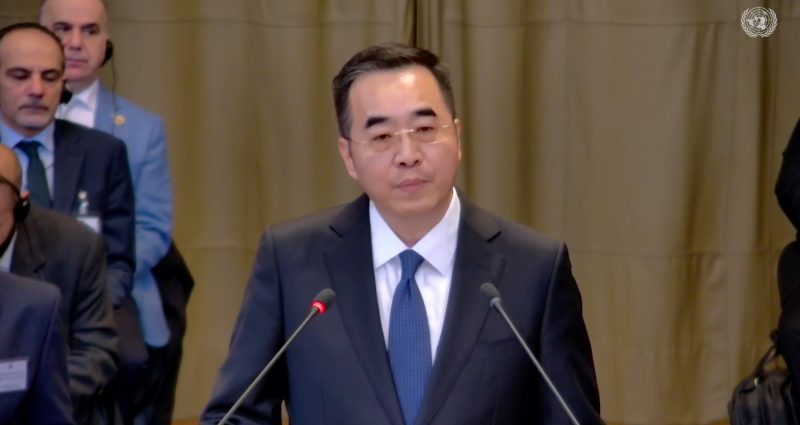
Ma stated, “The Palestinian people fight against Israeli oppression and their struggle for completing establishment of an independent state on the occupied territory are essentially just actions for restoring their legitimate rights”.
The Chinese representative even included “armed struggle” into these actions, referring that “various people” had freed themselves from “colonial rule and foreign occupation” on that way.
Emphasizing that the occupation was “unlawful”, the Chinese envoy “encouraged both sides to accommodate each other’s legitimate concerns” and continue to work for a peaceful settlement.
Iran: Occupation started in 1948, self-determination with a referendum Palestine’s territory at that time
The Islamic Republic of Iran was represented Reza Najafi, Deputy Foreign Minister for Legal and International Affairs, Ministry of Foreign Affairs.
Describing the situation in Gaza, Najafi said “we remain a turning point in the history of mankind”, where “the court can set the ground” to save thousands of lives and “contribute to self-determination”.
In difference to other speaker who demanded to establish Palestine in the borders of 1967, the Iranian representative said occupation had started “with the illegal formation of Israeli occupying regime in 1948 instead of the former British mandate of Palestine”, displacing more than 700.000 Palestinians.
After describing the genocidal and apartheid regime Israel has established, Najafi stated that the “inaction or insufficient action is one of the main causes of prolonged occupation”. Najafi also hinted to the “stalemate caused by a certain permanent member” of the Security Council.
Concluding, the Iranian representative reiterated the “long-standing position” of Iran that the only legal, practical, democratic and just method to effectively realize the inherent right to self-determination of the Palestinian people is to hold a national referendum in the Palestine.”
As Iran does not recognize the state of Israel, Palestine here refers to its territory of 1948.
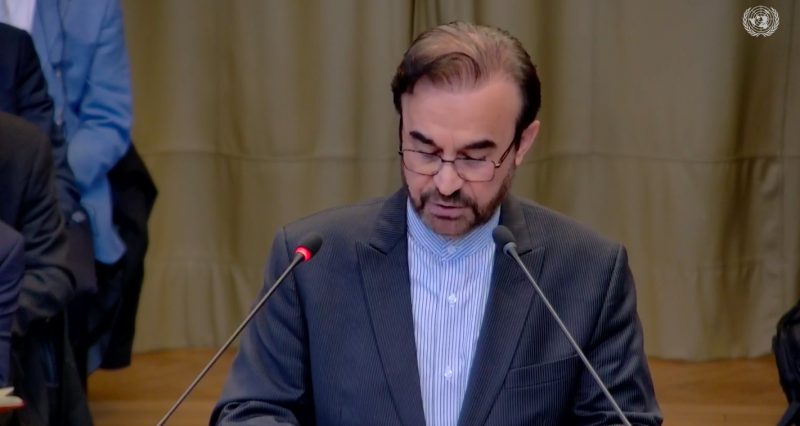
Iraq: Israel commits war crimes and genocide
Hayder Albarrak, Head of the Legal Department of the Ministry of Foreign Affairs, spoke on behalf of Iraq.
Similar to the Iranian representative, Albarrak also stated that the “tragedy of the country called Palestine and the ordeal of its people began in 1948”.
“The Israeli occupying entity adopts multiple practices that rise to the level of genocide, referring specifically to the Convention of on the Prevention and Punishment of Genocide from 1948”, Albarrak stated.
The Iraqi representative also stated that the “barbaric acts committed by the occupying Israeli entity, the airstrikes and rockets targeting civilians constitute war crimes. The Israeli occupying entity must be held accountable.”
Ireland: European Union should “review trade relationship” with settlers
On behalf Ireland spoke Rossa Fanning, Attorney General.
Fanning emphasized that Ireland “is committed to the global order based on respect for international law”, considering the matter of “profound concern for the Irish government”.
The Irish representative condemned the attacks launched by Hamas but also stated that in Ireland’s view, Israel’s self-defense “exceeds the limits of international law” by goşng beyond the “necessary and proportionate”.
“This is manifest from the spiraling death toll, the extensive destruction of property, including homes throughout Gaza, the displacement of up to 2 million people, and the ensuing humanitarian catastrophe”, Fanning said.
“Israel is and has been engaged in a process of annexation of land for decades”, said the Irish representative, pointing out especially illegal settlement activities. Fanning stated that Israeli security forces “in some instances even participated” in settlers’ violence.
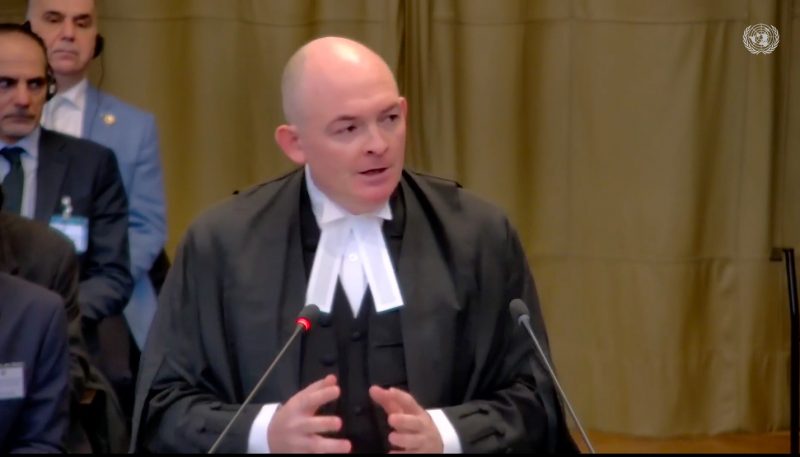
The Irish Attorney General warned other states “not to recognize the illegal situation”, “not to render aid in maintaining the situation” and to “cooperate to bring the serious breach to an end”.
In the case of Ireland, this meant within the European Union “to review their trading relationship with the settlements in the Occupied Palestinian Territories”, Fanning concluded.
Japan: Insisting on the principle of non-acquisition of territory by force
Tomohiro Mikanagi, Director General, International Legal Affairs Bureau/Legal Adviser, Ministry of Foreign Affairs, Dapo Akande, Professor of Public International Law, University of Oxford represented the government of Japan.
The Japanese presented focused “exclusively on the issues relating to the acquisition of territory by force”, Mikanagi said.
“Japan is of the view that due consideration should be given to the relevant resolutions”, said Mikanagi, quoting these demanded “withdrawal of Israel-armed forces from territories occupied in the recent conflict”.
Discussing the argument of self-defense, Akande concluded “the aim of self-defense is limited to defending the attack state and its people. Thus, even when a state has suffered an armed attack, it can never be proportionate to permanently deprive a people of its territory”. Akande implicitly rejected Israel’s expansion without naming the actor.
He finished his presentation sating that for Japan, the principle of non-acquisition of territory by force is an important norm.
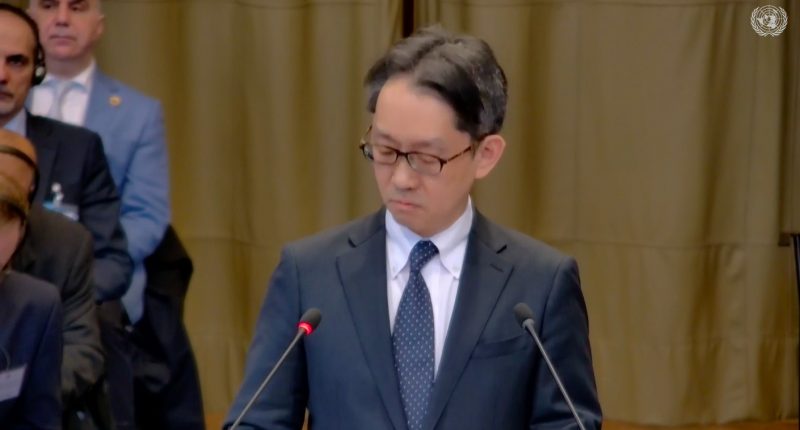
Jordan: Israel creates “global religious tension”
On behalf of Jordan spoke Ayman Safadi, Deputy Prime Minister and Minister of Foreign Affairs and Expatriates of the Hashemite Kingdom of Jordan, Ahmad Ziadat, Minister of Justice, and Michael Wood, legal counsel.
“The Israeli aggression in Gaza is shattering thousands of lives, destroying a community of 2.3 million Palestinians who have already been suffering the oppression of occupation”, began Safadi his words.
“Palestinians are dying by Israel’s war. This aggression has to end immediately. Those responsible for it must face justice. No country must be above law”, said the Deputy Prime Minister of Jordan.
“There can be no peace until the right of the Palestinian people to self-determination by the establishment and global recognition of an independent, sovereign Palestinian state with east Jerusalem as its capital”, the Jordanian representative said.
Minister of Justice, Ahmat Ziadat referred on the situation in Jerusalem, where Jordan is the custodian of the holy sites of Muslims and Christians.
Detailing Israel’s attacks on and destruction of these holy sites, Ziadat warned these not only violate international law but also “inflame global religious tension and create confrontation along religious lines”.
Legal counsel Michael Wood elaborated on the international law regarding occupation and concluded “Israel must end its occupied of the whole of the occupied Palestinian territory, the West Bank, including East Jerusalem and Gaza”.
Kuwait: Occupation is “illegal”
Kuwait was represented by Ali Ahmad Ebraheem S. Al-Dafiri, Ambassador of the State to the Kingdom of the Netherlands, Agent of the State of Kuwait, Tareq M. A. M. Al-Banai, Permanent Representative to the United Nations and Tahani R. F. Al-Naser, Assistant Foreign Minister of Legal Affairs.
This is a conflict between “on one side an occupying power equipped with all military means and the other side an occupied nation without defensive capabilities facing daily expulsion, human rights violation and all sufferings associated with any occupation situation”, said Al-Dafiri in his introduction.
Al-Banai displayed the “true nature” of the occupation by point to forced displacement, which in 1948 affected 750.000 Palestinians and later millions, the demolition of homes and lands in the occupied territories and the illegal settlement of around 730.000 into the occupied territories, including 230.000 persons to East Jerusalem.
He also emphasized the existence of an apartheid regime that included Jews-only-roads, special rights, facilities and subsidies exclusively for Jewish settlers, the deprivation of Palestinians from water resources, where settlers and foreign companies exploit agricultural products of the occupied territories.
As last speaker for Kuwait, Al-Naser demonstrated the illegality of the occupation by pointing to its violation of self-determination, the prohibition of the use force to acquire territory, the prohibition of annexation and the violation of military law that limits occupation duration.
Lebanon: While breaching the right of self-determination, Israel robs “agricultural land, water and mineral resources
On behalf of the Lebanese government spoke Abdel Sattar Issa, Ambassador to the Kingdom of the Netherlands.
Issa considered the conflict around Palestine a “subject of the greatest importance to the entirety of the international community”, with the “record number of requests to intervene before the court being the clearest proof of it”.
As other speakers, Issa also showed that Israel’s occupation is a violation of several, and since the operation against Gaza, growing number of preemptory international norms, with the prohibition to genocide being the last one.
The Lebanese speaker reminded that a month ago, the Secretary General of the UN had invited all states to recognize the Palestinian’s right to establish an independent state, and he invited the court “to give its opinion on this point.”
“Lebanon considers that Israel is breaching all the constituent elements of the right of the Palestinian people to self-determination, which is 1. political and economic independence, 2. permanent sovereignty over its wealth and natural resources, and 3. territorial integrity” said Issa, reminding also of “Israel’s policy of confiscating agricultural land, exploiting water and mineral resources”.
Israel must “dismantle the settlements in occupied Palestinian territories,” said Issa.
He also stated that the United Nations and specifically the Secretary General and the Security Council “must take all necessary measures to ensure the implementation of their relevant resolutions”.
Libya: States have “moral and legal obligation” to “assist the Palestinians in their legitimate struggle”
Libya was represented by Ahmed Al Gehani, Libyan representative to the International Criminal Court, and Professor Nasser Al Ghita.
“The crimes committed by Israel tantamount to the crime of genocide and other international crimes”, began Al Gehani, calling “on the international community as a whole and on organs of the United Nations to put an end to this tragedy”.
As many others speakers, the Libyan delegate also demonstrated how Israel’s actions consitute a “continuing, gross and systematic breach of its legal obligations under the United Nations Charter, the general international law, the international humanitarian law and human rights las and customary law.”
Al Gehani stated: “The Palestinian people have the right to resist the occupation by all means, and it is a moral and legal obligation upon all states to assist and support the Palestinians in their legitimate struggle for liberty and independence.”
Professor Al Ghita continued on behalf of the Libyan delegation and demanded “The occupying power is obliged to immediately, unconditionally, and completely end its occupation and withdraw from the Occupied Palestinian Territories”, to “revoke all legislation aiming at the annexation of Jerusalem”, the withdrawal of all occupation forces and the dismantling of its discriminatory legislations”.
Luxemburg: Settlers endanger two-state-solution
Alain Germeaux, Director of Legal Affairs, Ministry for Foreign and European Affairs of the Grand Duchy of Luxembourg spoke on behalf of his country.
Germeaux first stated that his country had supported the General Assembly resolution that called the ICJ to provide an advisory opinion. He expressed hope that “the court will strengthen the role of the UN and contribute to achieving a peaceful solution of the Israeli-Palestinian conflict consistent with international law”.
Recalling the court’s advisory opinion from 2004, Germaux detected that Israel’s the human rights violations observed back then “seem to have continued” due to the expansion of settlements.
The Luxemburg representative stated this happened despite “explicit and repeated condemnations” by the Security Council and the General Assembly and in a “manner unjustifiable with military necessity.”
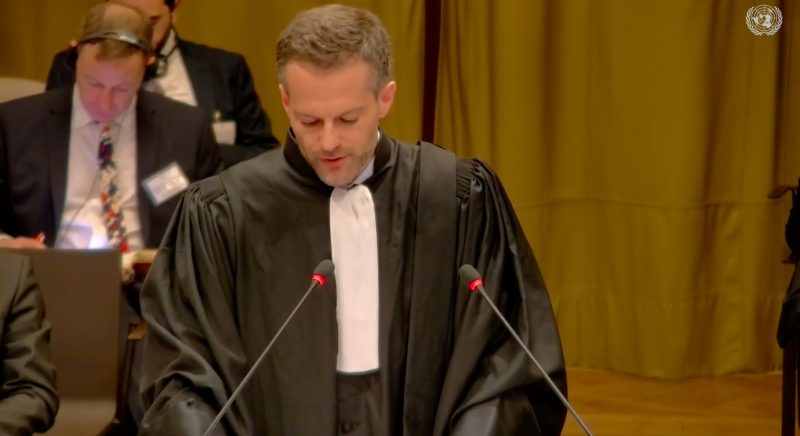
Germaux said UN reports showed “equally that Palestinians are increasingly victims of violence carried out by settlers”, without enjoying protection, leading to the emergence of a “coercive environment”.
“The international community shares great concern” regarding these settlements, stated the representative from Luxemburg, “which constitute a practice which is prejudicial to achieving the two-state-solution” and a “flagrant violation” of international law.
Germaux also called Israel “to investigate and reveal the facts on the ground and conduct inquiries to identify and prosecute the people responsible”.
Malaysia: Palestine needs self-determination
On behalf of Malaysia spoke Dato’ Seri Utama Haji Mohamad Haji Hasan, Minister for Foreign Affairs.
“I stand here today, while Gaza is facing devastation, including Rafah, at the southern end of the Strip”, Hasan started his presentation, continuing “the Palestinian people have long suffered dehumanization and brutal collective punishment.”
The Malaysian Minister detected that Israel had violated international humanitarian law, the law of occupation, international human rights law, the prohibition of the use of force, and the associated prohibition of acquisition of territory by use of force.
He then articulated the basic demands in regard to Palestinian self-determination, including “territorial integrity”, “the protection of its integrity”, “permanent sovereignty over its natural wealth and resources”, and “the freedom to pursue economic, cultural, social development.”
The Malaysian minister demanded Israel should remove all military, administrative and legislative obstacles before this self-determination of the Palestinian people.
Mauritius: “Palestine possesses all necessary attributes to be recognized as a state”
Mauritius was represented by Jagdish D. Koonjul, Permanent Representative to the United Nations and Pierre Klein, Professor of International Law at the Université Libre de Bruxelles,
The last presentation on Thursday came from Mauritius. The countries permanent representative to the UN made an extended reference to the so called Chagos Case.
The case had been opened by Mauritius against the United Kingdom in a dispute over sovereignty over the archipelago, located close to Mauritius but remaining under British control after the country’s decolonization.
Several statements during the actual hearing also quoted the case in favor of Palestinian self-determination.
In 2019, the ICJ delivered an advisory opinion that, according to Koonjul, “the United Kingdom is under an obligation to bring an end to its administration of the Chagos Archipelago as rapidly as possible”. The ambassador described how that opinion set in motion a series of decisions which lead the United Kingdom to begin negotiations with Mauritius over the exercise over sovereignty.
“We believe that the Palestinians must be able to live in freedom and in their own state. We also firmly believe that Palestine possesses all the necessary attributes to be recognized as a state. Mauritius has indeed already recognized it as such”, concluded the country’s ambassador to the UN.

















Leave a Reply